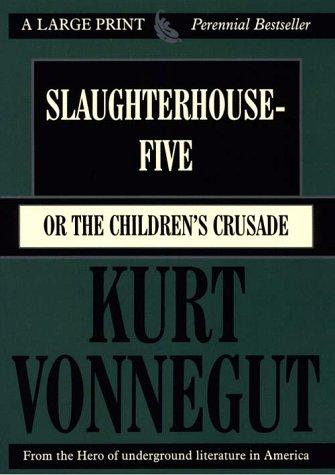Manifesto Pacifista da leggere
5 stars
Attraverso l'alter-ego di Billy Pilgrim, Vonnegut, elabora un racconto autobiografico sull'esperienza terribile della Seconda Guerra Mondiale. Da leggere assolutamente.
a duty-dance with death (G.K. Hall large print perennial bestseller series)

232 pages
English language
Published July 15, 1998 by G.K. Hall.
Slaughterhouse-Five, also known as The Children's Crusade: A Duty-Dance with Death is a science fiction infused anti-war novel by Kurt Vonnegut, first published in 1969. It follows the life and experiences of Billy Pilgrim, from his early years to his time as an American soldier and chaplain's assistant during World War II, to the post-war years, with Billy occasionally traveling through time. The text centers on Billy's capture by the German Army and his survival of the Allied firebombing of Dresden as a prisoner of war, an experience which Vonnegut himself lived through as an American serviceman. The work has been called an example of "unmatched moral clarity" and "one of the most enduring antiwar novels of all time".
Attraverso l'alter-ego di Billy Pilgrim, Vonnegut, elabora un racconto autobiografico sull'esperienza terribile della Seconda Guerra Mondiale. Da leggere assolutamente.
It's a little embarrassing to confess that I'd never read Vonnegut. That's not true. I read Harrison Bergeron in some sort of enrichment reader in 6th grade. I thought that was pretty great, and the only story I remember fondly from that age outside of an Edgar Allen Poe collection that I probably read until the cover came off, and then read again. Somehow I always expected this book to be some kind of hippie acid trip because the people I knew growing up who read it had black light posters and blew smoke into their iguanas' faces to give them a contact high. I did not expect the book to be about WWII, to play with time the way it did, or to make me cry, not for anything in particular, but just a little catharsis for a moment after the book was finished. The book is lively and …
It's a little embarrassing to confess that I'd never read Vonnegut. That's not true. I read Harrison Bergeron in some sort of enrichment reader in 6th grade. I thought that was pretty great, and the only story I remember fondly from that age outside of an Edgar Allen Poe collection that I probably read until the cover came off, and then read again. Somehow I always expected this book to be some kind of hippie acid trip because the people I knew growing up who read it had black light posters and blew smoke into their iguanas' faces to give them a contact high. I did not expect the book to be about WWII, to play with time the way it did, or to make me cry, not for anything in particular, but just a little catharsis for a moment after the book was finished. The book is lively and readable, and feels at all points as though you've read it before, but can still be utterly disarming, especially when humor gives way to Vonnegut's most humane or damning observations.
It's a little embarrassing to confess that I'd never read Vonnegut. That's not true. I read Harrison Bergeron in some sort of enrichment reader in 6th grade. I thought that was pretty great, and the only story I remember fondly from that age outside of an Edgar Allen Poe collection that I probably read until the cover came off, and then read again. Somehow I always expected this book to be some kind of hippie acid trip because the people I knew growing up who read it had black light posters and blew smoke into their iguanas' faces to give them a contact high. I did not expect the book to be about WWII, to play with time the way it did, or to make me cry, not for anything in particular, but just a little catharsis for a moment after the book was finished. The book is lively and …
It's a little embarrassing to confess that I'd never read Vonnegut. That's not true. I read Harrison Bergeron in some sort of enrichment reader in 6th grade. I thought that was pretty great, and the only story I remember fondly from that age outside of an Edgar Allen Poe collection that I probably read until the cover came off, and then read again. Somehow I always expected this book to be some kind of hippie acid trip because the people I knew growing up who read it had black light posters and blew smoke into their iguanas' faces to give them a contact high. I did not expect the book to be about WWII, to play with time the way it did, or to make me cry, not for anything in particular, but just a little catharsis for a moment after the book was finished. The book is lively and readable, and feels at all points as though you've read it before, but can still be utterly disarming, especially when humor gives way to Vonnegut's most humane or damning observations.
I liked how Vonnegut manages to tell a poignant war story in a gentle way, without any attempt to glorify anything or anyone. I guess this became a classic because it makes people reflect on their values and their approach to life. And maybe even prompt them to question their own views. To do the above through a novel in a gentle way is the accomplishment of this book.
This is my first Vonnegut novel. When I was reading it, I was surprised how much Douglas Adams' (Hitchhiker's Guide to the Galaxy) style was influenced by Vonnegut.